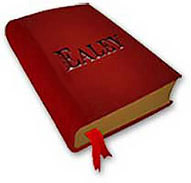EXPERTS seem to agree that the names "Annett" and "Annetts"—and variations with differing vowels between the 'n' and the 't'—are alternative versions of the same surname. In our family the 's' was dropped after a move from the parish of Binsted, where the children were consistently recorded as "Annitts", to the parish of Bramshott, where one child was baptised as "Annatt", and another as "Annet". The relocation can be dated to the fairly narrow window of 1765 to 1767 and points to the influence of parish clergy on the evolution of surnames.
As far as the origin of the name is concerned, it doesn't seem to be descriptive of any occupation or personal attribute, which leaves two possibilities: either it's a patronymic (or, in this case, a matronymic), or it describes a place of origin.
MATRONYMIC
The theory here is that "Annett" means "Son of Ann" – the equivalent of Annotson and Anson. This would imply that some time in the Middle Ages a lady named Ann gave birth to one or more children who, when officialdom demanded a surname of their adult selves, offered up "Annett". I was a bit sceptical of this at first. Would not, I thought, "Annson" be the more likely handle for a child of Ann? However, people who know about these things make authoritative claims about the suffix 'et'. Richard McKinley in 'A History of British Surnames' says
Endings found in some surnames derived from personal names originate from hypochoristic forms of personal names introduced into Britain after the Conquest. These include the final syllables '-et', '-ot', '-mot', '-on', and '-in' (Mackinley).
Hypochoristic. A big polysyllabic wallop of a qualifier. It means, apparently, the familiar form of a name. A pet name. A nickname. So, according to this line of reasoning, the surname "Annett" is equivalent to the forename "Annette", which means "Little Ann".
Big Ann, Little Ann. I get it.
Place of Origin
Interestingly, there is a small village called Little Ann in Hampshire. It's situated beside Pillhill Brook which, along with the present River Anton, used to be called the River Ann.
This river provides an alternative explanation for the surname "Annett". If correct it would mean that our ancestors were once settled along the valley of the Ann, probably before the fourteenth century.
There is a short, interesting article, published by Wiltshire Family History Society, which looks at the distribution of "Annetts" and "Annett" in the area formerly known as Wessex, and examines the case for the surname having originated in the Ann Valley.
I find this explanation of the origin of our surname the more plausible of the two.
Northumberland?
Bardsley notes that "Annet" was the Northumberland name for the common gull and that the familiar forename "Annette" is especially popular on the north-east coast of England. These two facts seem neither here nor there so far as I can see. However, in 1555 one Rolphe Annot, member of a Lombardian family who had migrated to France, landed in Northumberland, and became the founding father of a long, many-branching line of English Annetts. It's not impossible that there's a missing link which will eventually anchor us to this sturdy Annett tree, but at present it looks more likely that our name originated independently in the old Wessex area. The addition of the "s" in early entries seems to suggest this.
The Solitary Anglo-Saxon
This is irrelevant, but I love the fact that the Anglo-Saxon word "Šnett" and its variants "śnett", "śnettes" and "śnyttes", means "Solitude".
![The River Anton at Upper Clatford, Hampshire © Chris Talbot, Wikimedia Commons Chris Talbot [CC BY-SA 2.0 (http://creativecommons.org/licenses/by-sa/2.0)], via Wikimedia Commons](Images/river_anton_.jpg)

